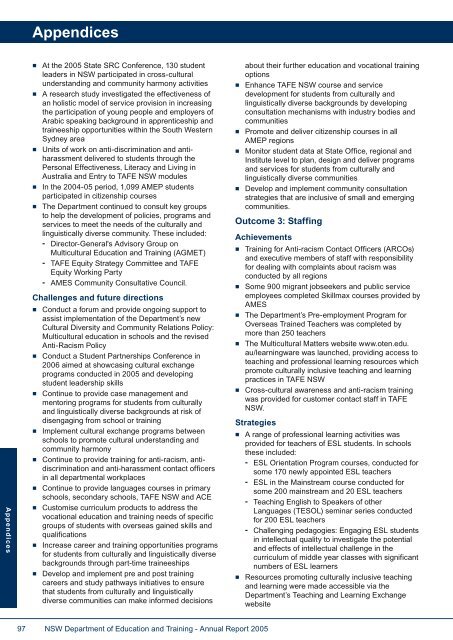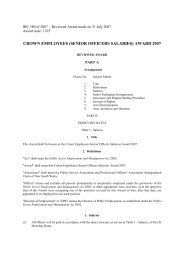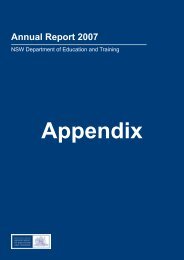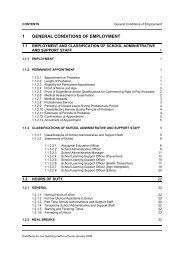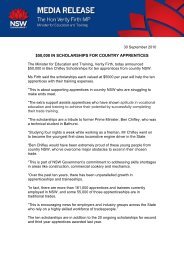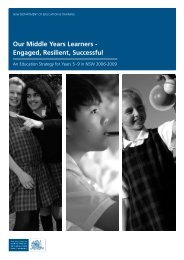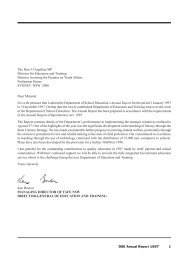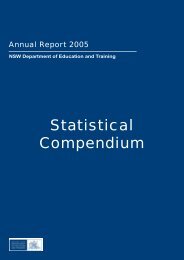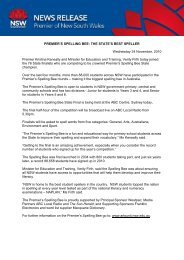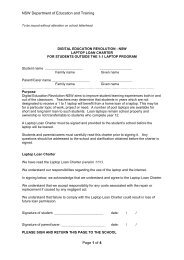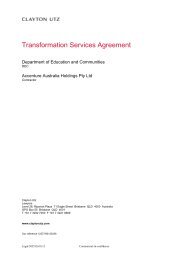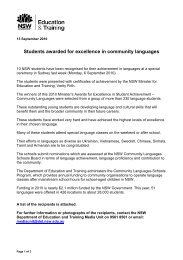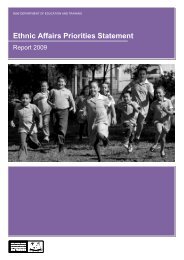Annual Report 2005 NSW Department of Education and Training
Annual Report 2005 NSW Department of Education and Training
Annual Report 2005 NSW Department of Education and Training
You also want an ePaper? Increase the reach of your titles
YUMPU automatically turns print PDFs into web optimized ePapers that Google loves.
Appendices<br />
Appendices<br />
• At the <strong>2005</strong> State SRC Conference, 130 student<br />
leaders in <strong>NSW</strong> participated in cross-cultural<br />
underst<strong>and</strong>ing <strong>and</strong> community harmony activities<br />
• A research study investigated the effectiveness <strong>of</strong><br />
an holistic model <strong>of</strong> service provision in increasing<br />
the participation <strong>of</strong> young people <strong>and</strong> employers <strong>of</strong><br />
Arabic speaking background in apprenticeship <strong>and</strong><br />
traineeship opportunities within the South Western<br />
Sydney area<br />
• Units <strong>of</strong> work on anti-discrimination <strong>and</strong> antiharassment<br />
delivered to students through the<br />
Personal Effectiveness, Literacy <strong>and</strong> Living in<br />
Australia <strong>and</strong> Entry to TAFE <strong>NSW</strong> modules<br />
• In the 2004-05 period, 1,099 AMEP students<br />
participated in citizenship courses<br />
• The <strong>Department</strong> continued to consult key groups<br />
to help the development <strong>of</strong> policies, programs <strong>and</strong><br />
services to meet the needs <strong>of</strong> the culturally <strong>and</strong><br />
linguistically diverse community. These included:<br />
- Director-General's Advisory Group on<br />
Multicultural <strong>Education</strong> <strong>and</strong> <strong>Training</strong> (AGMET)<br />
- TAFE Equity Strategy Committee <strong>and</strong> TAFE<br />
Equity Working Party<br />
- AMES Community Consultative Council.<br />
Challenges <strong>and</strong> future directions<br />
• Conduct a forum <strong>and</strong> provide ongoing support to<br />
assist implementation <strong>of</strong> the <strong>Department</strong>’s new<br />
Cultural Diversity <strong>and</strong> Community Relations Policy:<br />
Multicultural education in schools <strong>and</strong> the revised<br />
Anti-Racism Policy<br />
• Conduct a Student Partnerships Conference in<br />
2006 aimed at showcasing cultural exchange<br />
programs conducted in <strong>2005</strong> <strong>and</strong> developing<br />
student leadership skills<br />
• Continue to provide case management <strong>and</strong><br />
mentoring programs for students from culturally<br />
<strong>and</strong> linguistically diverse backgrounds at risk <strong>of</strong><br />
disengaging from school or training<br />
• Implement cultural exchange programs between<br />
schools to promote cultural underst<strong>and</strong>ing <strong>and</strong><br />
community harmony<br />
• Continue to provide training for anti-racism, antidiscrimination<br />
<strong>and</strong> anti-harassment contact <strong>of</strong>ficers<br />
in all departmental workplaces<br />
• Continue to provide languages courses in primary<br />
schools, secondary schools, TAFE <strong>NSW</strong> <strong>and</strong> ACE<br />
• Customise curriculum products to address the<br />
vocational education <strong>and</strong> training needs <strong>of</strong> specific<br />
groups <strong>of</strong> students with overseas gained skills <strong>and</strong><br />
qualifications<br />
• Increase career <strong>and</strong> training opportunities programs<br />
for students from culturally <strong>and</strong> linguistically diverse<br />
backgrounds through part-time traineeships<br />
• Develop <strong>and</strong> implement pre <strong>and</strong> post training<br />
careers <strong>and</strong> study pathways initiatives to ensure<br />
that students from culturally <strong>and</strong> linguistically<br />
diverse communities can make informed decisions<br />
about their further education <strong>and</strong> vocational training<br />
options<br />
• Enhance TAFE <strong>NSW</strong> course <strong>and</strong> service<br />
development for students from culturally <strong>and</strong><br />
linguistically diverse backgrounds by developing<br />
consultation mechanisms with industry bodies <strong>and</strong><br />
communities<br />
• Promote <strong>and</strong> deliver citizenship courses in all<br />
AMEP regions<br />
• Monitor student data at State Office, regional <strong>and</strong><br />
Institute level to plan, design <strong>and</strong> deliver programs<br />
<strong>and</strong> services for students from culturally <strong>and</strong><br />
linguistically diverse communities<br />
• Develop <strong>and</strong> implement community consultation<br />
strategies that are inclusive <strong>of</strong> small <strong>and</strong> emerging<br />
communities.<br />
Outcome 3: Staffing<br />
Achievements<br />
• <strong>Training</strong> for Anti-racism Contact Officers (ARCOs)<br />
<strong>and</strong> executive members <strong>of</strong> staff with responsibility<br />
for dealing with complaints about racism was<br />
conducted by all regions<br />
• Some 900 migrant jobseekers <strong>and</strong> public service<br />
employees completed Skillmax courses provided by<br />
AMES<br />
• The <strong>Department</strong>’s Pre-employment Program for<br />
Overseas Trained Teachers was completed by<br />
more than 250 teachers<br />
• The Multicultural Matters website www.oten.edu.<br />
au/learningware was launched, providing access to<br />
teaching <strong>and</strong> pr<strong>of</strong>essional learning resources which<br />
promote culturally inclusive teaching <strong>and</strong> learning<br />
practices in TAFE <strong>NSW</strong><br />
• Cross-cultural awareness <strong>and</strong> anti-racism training<br />
was provided for customer contact staff in TAFE<br />
<strong>NSW</strong>.<br />
Strategies<br />
• A range <strong>of</strong> pr<strong>of</strong>essional learning activities was<br />
provided for teachers <strong>of</strong> ESL students. In schools<br />
these included:<br />
- ESL Orientation Program courses, conducted for<br />
some 170 newly appointed ESL teachers<br />
- ESL in the Mainstream course conducted for<br />
some 200 mainstream <strong>and</strong> 20 ESL teachers<br />
- Teaching English to Speakers <strong>of</strong> other<br />
Languages (TESOL) seminar series conducted<br />
for 200 ESL teachers<br />
- Challenging pedagogies: Engaging ESL students<br />
in intellectual quality to investigate the potential<br />
<strong>and</strong> effects <strong>of</strong> intellectual challenge in the<br />
curriculum <strong>of</strong> middle year classes with significant<br />
numbers <strong>of</strong> ESL learners<br />
• Resources promoting culturally inclusive teaching<br />
<strong>and</strong> learning were made accessible via the<br />
<strong>Department</strong>’s Teaching <strong>and</strong> Learning Exchange<br />
website<br />
97 <strong>NSW</strong> <strong>Department</strong> <strong>of</strong> <strong>Education</strong> <strong>and</strong> <strong>Training</strong> - <strong>Annual</strong> <strong>Report</strong> <strong>2005</strong>


